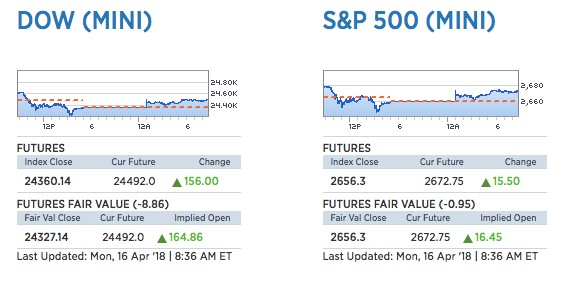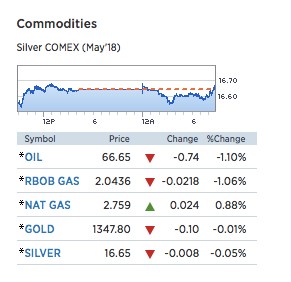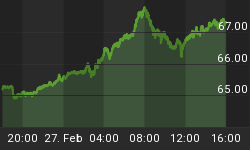Some 100 missile attacks against three separate Syrian regime targets by a U.S., British and French ‘coalition’ over the weekend hasn’t spooked Wall Street, with U.S. stock index futures up ahead of the opening bell Monday morning and investors focused more on earnings than geopolitics.
The missile strikes, ostensibly to punish the Syrian regime for an alleged chemical attack on civilians in an area that Assad still does not control, were launched late on Friday, with Trump later tweeting “mission accomplished”.
Stock index futures didn’t even blink. By pre-market trading at 8:37am EST, the Dow had gained 156 points, while the S&P 500 had gained over 15 points.

(Click to enlarge)
Nasdaq was up almost 41 points, but European markets were all down, along with Asian markets, with the exception of the Nikkei and the ASX 200.
While oil prices usually like a bit of geopolitical chaos, commodities were trading down in the early morning, with the exception of natural gas, which saw a slight boost.

(Click to enlarge)
Launching air strikes against Syria does nothing to change the fundamental oil balance, and only a boots-on-the-ground war would have any chance of moving oil prices significantly. Air strikes are generally a blip on the radar when there is no clear indication that an all-out ground invasion would follow it, or that Russia might take this as a direct attack on its sovereignty and a declaration of war.
Trump’s long-standing pledge has been to pull out of Syria altogether, so air strikes represent a complete reversal of earlier stated policies. There are some 2,000 U.S. personnel on the ground in Syria.
And on Monday morning, French President Emmanuel Macron claimed to have “convinced” Trump to remain in Syria long term. White House spokeswoman Sarah Sanders rebutted Macron’s statement, vaguely, saying: “The US mission has not changed—the president has been clear that he wants US forces to come home as quickly as possible.”
He also said the U.S. remained committed to its plan to “completely crush” the Islamic State there. Related: Millennials Prefer Cash To Credit Cards
Trump noted that “America does not seek an indefinite presence in Syria—under no circumstances.”
Regardless, a presence with occasional barrages of air strikes won’t be enough to shake up commodities or to convince Wall Street that there’s something to worry about. And Wall Street analysts have little time for deciphering complex alliances in Syria and whether the battle here is against Assad or the Islamic State.
So far, Wall Street seems to be evaluating the Syria strikes as a minor show of muscle that isn’t going to be backed up by any attempt at a regime change that would spark a third world war.
Instead, it’s still all about the earnings season, which is upon us now. If anything tanks the market now, it’s going to be this.
While it’s gotten off to a pretty good start for Q1 earnings reports, Nobel Prize-winning economist Robert Shiller fears that the correction may not be over and earnings may not be strong enough to move from red to black. Stocks are still overvalued, he told CNBC’s Trading Nation.
"As of the fourth quarter, real S&P 500 earnings were still below their 2015, if you correct for inflation. So, it's not like we are in this spectacular market," Shiller said.
By Fred Dunkley for Safehaven.com
More Top Reads From Safehaven.com:
















